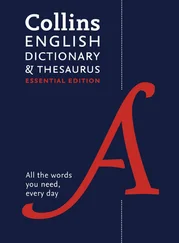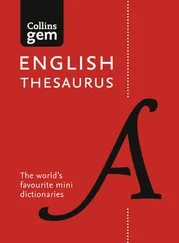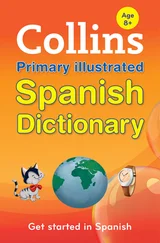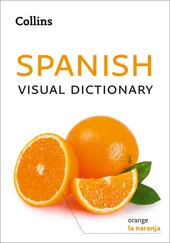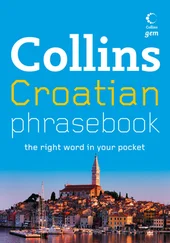
Copyright
HarperCollins Publishers
Westerhill Road
Bishopbriggs
Glasgow G64 2QT
Third Edition 2017
© HarperCollins Publishers 2007, 2010, 2017
Source ISBN: 9780008135928
Ebook Edition © March 2017 ISBN: 9780008230098
Version: 2017-02-01
Collins® and Collins Gem® are registered trademarks of HarperCollins Publishers Limited
www.collinsdictionary.com
All rights reserved under International and Pan-American Copyright Conventions. By payment of the required fees, you have been granted the non-exclusive, non-transferable right to access and read the text of this e-book on screen. No part of this text may be reproduced, transmitted, downloaded, decompiled, reverse engineered, or stored in or introduced into any information storage and retrieval system, in any form or by any means, whether electronic or mechanical, now known or hereafter invented, without the express written permission of HarperCollins.
Entered words that we have reason to believe constitute trademarks have been designated as such. However, neither the presence nor absence of such designation should be regarded as affecting the legal status of any trademark.
The contents of this publication are believed correct at the time of creation. Nevertheless the Publisher can accept no responsibility for errors or omissions, changes in the detail given or for any expense or loss thereby caused.
HarperCollins does not warrant that any website mentioned in this title will be provided uninterrupted, that any website will be error free, that defects will be corrected, or that the website or the server that makes it available are free of viruses or bugs. For full terms and conditions please refer to the site terms provided on the website.
HarperCollinsPublishers has made every reasonable effort to ensure that any picture content and written content in this ebook has been included or removed in accordance with the contractual and technological constraints in operation at the time of publication .
Acknowledgements
We would like to thank those authors and publishers who kindly gave permission for copyright material to be used in the Collins Corpus. We would also like to thank Times Newspapers Ltd for providing valuable data.
If you would like to comment on any aspect of this book, please contact us at the given address or online.
E-mail: dictionaries@harpercollins.co.uk
facebook.com/collinsdictionary
 @collinsdict
@collinsdict
Editor
Holly Tarbet
Contributors
Tessa Carroll
Harumi Currie
Miyoko Yamashita
For the Publisher
Gerry Breslin
Janice McNeillie
Using your phrasebook
Whether you’re on holiday or on business, your Collins Gem Phrasebook and Dictionaryis designed to help you locate the exact phrase you need, when you need it. You’ll also gain the confidence to go beyond what is in the book, as you can adapt the phrases by using the dictionary section to substitute your own words.
The Gem Phrasebook and Dictionaryincludes:
•Over 60 topics arranged thematically, so that you can easily find an expression to suit the situation
•Simple pronunciation which accompanies each word and phrase, to make sure you are understood when speaking aloud
•Tips to safeguard against any cultural faux pas, providing the essential dos and don’ts of local customs or etiquette
•A basic grammar section which will help you to build on your phrases
• FACE TO FACEdialogue sections to give you a flavour of what to expect from a real conversation
• YOU MAY HEARsections for common announcements and messages, so that you don’t miss important information when out and about
•A dictionary with over 1,000 words and their translations, to ensure you’ll never be stuck for something to say
•A short chapter of LIFELINEphrases for quick reference. These basic words and phrases will be essential to your time abroad
Before you jet off, it’s worth spending time looking through the topics to see what is covered and becoming familiar with pronunciation.
Contents
Copyright
Acknowledgements
Using your phrasebook
Pronouncing Japanese
Top ten tips
Talking to people
Hello/goodbye, yes/no
Key phrases
Work
Weather
Getting around
Asking the way
Bus and coach
Metro
Train
Taxi
Boat and ferry
Air travel
Customs control
Car hire
Driving
Petrol
Breakdown
Car parts
Road signs
Staying somewhere
Hotel (booking)
Hotel desk
Camping
Self-catering
Shopping
Shopping phrases
Shops
Food (general)
Food (fruit and veg)
Clothes
Clothes (articles)
Maps and guides
Post office
Technology
Leisure
Sightseeing and tourist office
Entertainment
Nightlife
Leisure/interests
Hot springs/public baths
Music
Theatre/opera
Sport
Walking
Communications
Telephone and mobile
Messaging
Internet
Practicalities
Money
Paying
Luggage
Repairs
Laundry
Complaints
Problems
Emergencies
Health
Pharmacy
Body
Doctor
Dentist
Eating out
Food in Japan
In a bar/café
Menu reader
Reading the menu
In a restaurant
Dietary requirements
Wines
Reference
Measurements and quantities
Numbers
Days and months
Time
Time phrases
Public holidays
Signs and notices
Pronouncing place names
Grammar
Dictionary
English – Japanese
A– C
D– F
G– I
J– L
M– O
P– R
S– U
V– Z
LIFELINE words and phrases
About the Publisher
Pronouncing Japanese
Although the Japanese writing system is rather complicated, pronouncing Japanese is easy once you know the few basic rules. This book has been designed so that as you read the pronunciation of the phrases, you can follow the Japanese. This will help you to recognize the different sounds and give you a feeling for the rhythm of the language. Below are a few rules for you to note.
In Japanese the basic unit of speech is the syllable. Each syllable is pronounced approximately the same length and rather flatly. Japanese has a pitched accent (high and low) but syllables do not have tones as they do in Chinese. It is more important not to stress any one part of a word. For example, in English the word Paris is pronounced paris and in French pa ree. Japanese gives equal strength to both syllables: pa ri.
Japanese has relatively few sounds. Each vowel has only one sound.
Читать дальше


 @collinsdict
@collinsdict